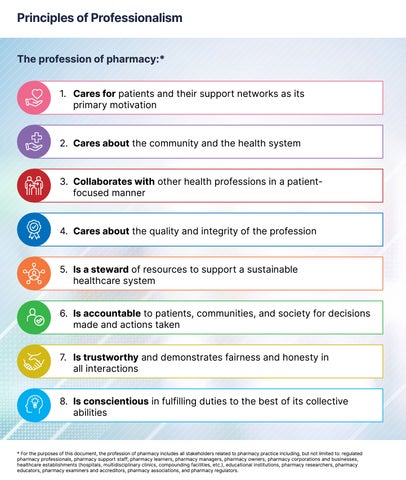Early in the first year of the program, the School welcomes each student into the profession of pharmacy through what is known as the White Coat Ceremony. This ceremony marks the students’ commitment to ethics and integrity, and includes a recitation of the Waterloo School of Pharmacy Student Pledge of Professionalism.
Purpose and importance of professionalism
- Professionalism is fundamental to the practice of pharmacy and is a core competency of Waterloo’s PharmD curriculum.
- Pharmacy students, faculty, and staff share collective responsibility for creating and maintaining an educational environment and culture that promotes professional behaviour and harmonious relationships.
- Each student, in accepting their PharmD offer of admission, acknowledges the privilege they have been afforded to study pharmacy. In accepting this privilege, the PharmD student recognizes that they are devoting their professional life to the service of humankind, and agree that throughout their education they will uphold:
- Student Pledge of Professionalism - University of Waterloo, School of Pharmacy
- Academic Integrity Core Values - University of Waterloo
- OCP Code of Ethics - Ontario College of Pharmacists
- NAPRA Model Standards of Practice - for Pharmacists and Pharmacy Technicians in Canada
Definition
While no universally accepted definition of professionalism exists, it is acknowledged that professionalism is multidimensional and extends well beyond the attributes of an individual person.
Professionalism is:
- A continuum from an individual’s attributes to interpersonal interactions to societal responsibility.
- A set of attitudes, skills and behaviours, and attributes and values, which are expected from those to whom society has extended the privilege of being considered a professional
- Extended to the entire profession of pharmacy including student members.
- A journey. It takes time, learning, and practice to earn the title of a professional.
Guiding Principles
Although “professionalism” and “honourable behaviour” are concepts open to interpretation, there is a set of behaviours that are consistent among most guidance documents used in pharmacy practice and literature. The behaviours listed below help to outline expectations for all members of the School community (including students, faculty, and staff), whether in an academic, experiential, extracurricular, or administrative setting.
Specifically, PharmD students agree to:
- Behave with honesty and integrity in all interactions in and outside the University setting;
- Understand that professional conduct cannot be intermittent or practiced only in certain contexts;
- Value competence and commit to lifelong learning;
- Respect all individuals regardless of differences in beliefs, values, or circumstances;
- Behave with humility, respecting the contributions and perspectives of patients, caregivers and other professionals;
- Recognize the importance of maintaining appropriate boundaries, preserve conflicts of interest, and preserving confidentiality;
- Accept responsibility for their actions and those of individuals under their supervision;
- Accept feedback in a non-defensive, constructive, and positive way and implement it to improve performance;
- Act reliably and dependably by fulfilling commitments on time;
- And respect the time of others. This includes adhering to class start and end times, group-established timelines, office hours, meeting times, etc.
Reporting and tracking professionalism (in and out of the classroom)
Learning
Over the course of the PharmD program, through lectures, discussions, assignments, workshops, and enrichment activities, students develop the knowledge, skills and aptitudes needed to allow them to meet the professionalism expectations of a pharmacist.
Although professional and ethical behaviour is emphasized in many courses, students in the four-year PharmD program at the University of Waterloo must complete six courses within the professional practice series, spanning across the first three years of the program. The objectives of the professional practice series are to develop and refine the skills required to practice the profession of pharmacy, encompassing jurisprudence, dispensing, medication therapy management, and addressing ethical issues in practice.
Assessment
To stress the importance of professional behaviour across all courses within the PharmD program, every course outline includes a discretionary deduction of up to 5% from a student’s final course grade for unprofessional behaviour:
“Students are expected to demonstrate professionalism in this course and unprofessional behaviour will result in up to a five percent deduction from your final mark, at the discretion of the instructor.”
PharmD students are expected to know the professionalism expectations of each course within the program by participating in course introductory lectures and reading all course overview information posted on LEARN including the official course outline which is the official contract between the student and instructor.
Experiential
In addition, professionalism is regularly incorporated into students' experiential education including learning and assessments in the following areas:
- Co-op Work Terms
- Community Service Learning
- Interprofessional Education
- Patient Care Rotations
These principles complement the PharmD program's guiding principles. They define the principles of professionalism that the profession of pharmacy agrees to strive toward and to open the dialogue around professionalism with stakeholders across the profession.
Learn more about NAPRA's Principles of Professionalism.
In addition to the professionalism components designed, tracked, and assessed within the curriculum, it is equally important to have a mechanism to report and track professionalism in all settings where members of the School of Pharmacy community interact.
For more detailed information about the School’s procedures related to professionalism reporting, tracking, and assessment see the Reporting Professionalism Achievements and Lapses page.

Pharmacy Links
Professionalism is not a label you give yourself - it's a description you hope others will apply to you.




